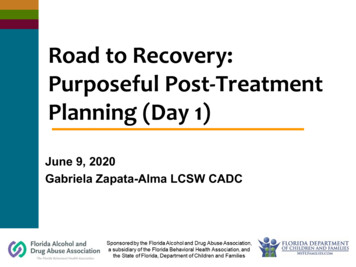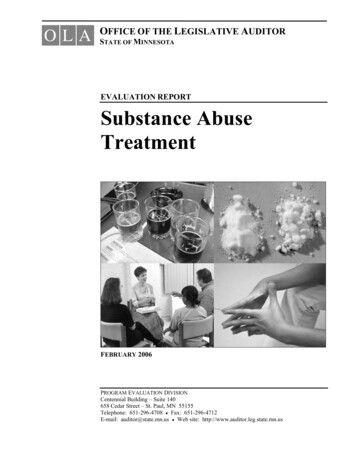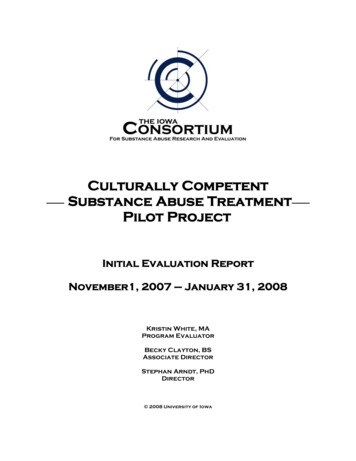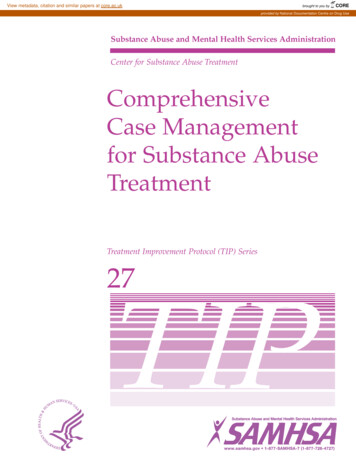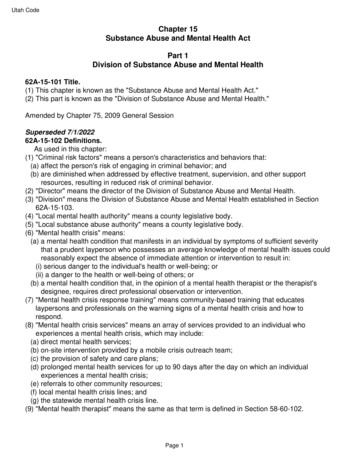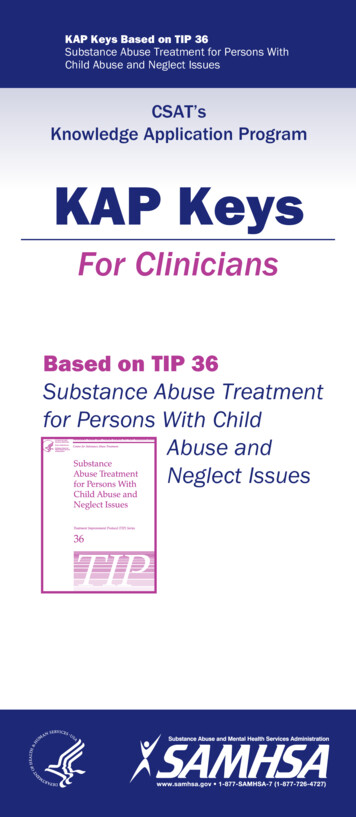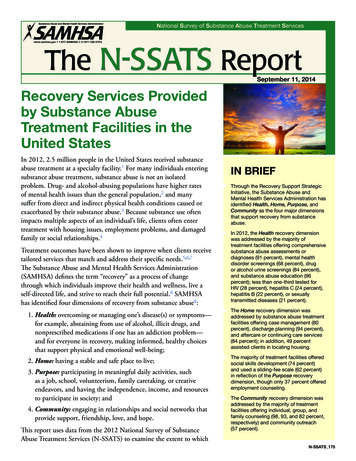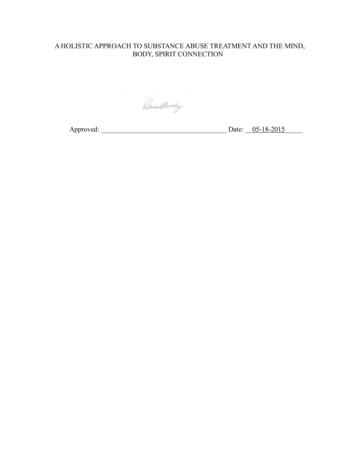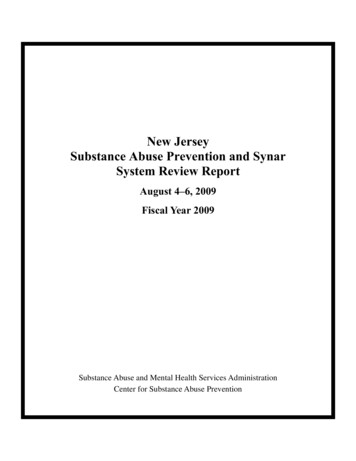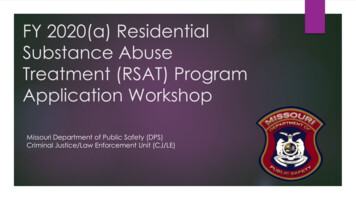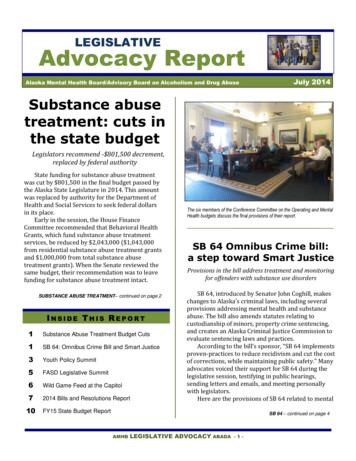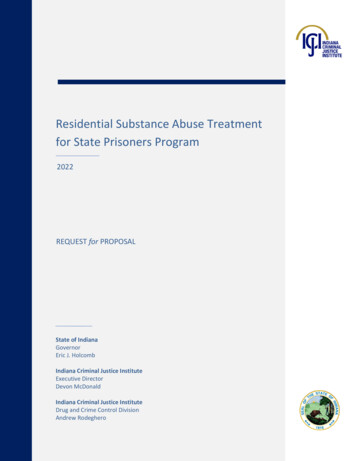
Transcription
Residential Substance Abuse Treatmentfor State Prisoners Program2022REQUEST for PROPOSALState of IndianaGovernorEric J. HolcombIndiana Criminal Justice InstituteExecutive DirectorDevon McDonaldIndiana Criminal Justice InstituteDrug and Crime Control DivisionAndrew Rodeghero
RESIDENTIAL SUBSTANCE ABUSE TREATMENT FOR STATE PRISONERSPROGRAM, 2022REQUEST FOR PROPOSALThe Indiana Criminal Justice Institute (ICJI) is now accepting applications for the Residential SubstanceAbuse and Treatment (RSAT) for State Prisoners Program. This grant is being released throughIntelliGrants. All applications must be submitted online through this system.HOW TO APPLYApplicants must be registered in IntelliGrants in order to access theelectronic application.RegisterorLog inApplications must be submitted via IntelliGrants on or before:WHEN TO APPLY11:59 p.m. ET on February 21, 2022Applicants are strongly encouraged to submit applications at least 48hours prior to the deadline.AWARD PERIODMay 1, 2022 – April 30, 2024TECHNICALASSISTANCEFor technical assistance with submitting an application, contact theICJI Helpdesk at CJIHelpDesk@cji.in.gov. ICJI Helpdesk hours areMonday – Friday 8:00 am to 4:30 pm ET, except state holidays.ICJI is not responsible for technical issues with grant submissionwithin 24 hours of grant deadline.POINT OF CONTACTFor assistance with any other requirements of this solicitation, pleasecontact: Sam Terry at STerry@cji.in.gov or Leann Jaggers atLeJaggers@cji.in.gov.RSAT 2022 RFP 2
TABLE OF CONTENTSProgram Overview .4Purpose of the Grant .4Program Areas .4Residential Programs .4Jail-Based Programs .5Aftercare Programs .6Eligibility Requirements .6Award Period .6Match Requirement .7Application Submission .8Application Review .8Evidence-Based Programs or Practices .9Selection Process and Award Notification . 10Allowable Costs . 10Contractors and Consultants . 10Unallowable Costs . 10Supplanting Prohibited . 11Reporting Requirements . 11Audit Requirements. 11Monitoring . 13Appendix A – Applicable Law and Mandatory Requirements . 14RSAT 2022 RFP 3
PROGRAM OVERVIEWThe Residential Substance Abuse Treatment (RSAT) for State Prisoners Program assists states with developingand implementing residential substance abuse treatment programs within state correctional facilities, as well aswithin local correctional and detention facilities, in which inmates are incarcerated for a period of time sufficientto permit substance abuse treatment. The program encourages the establishment and maintenance of drug-freeprisons and jails and developing and implementing specialized residential substance abuse treatment programsthat identify and provide appropriate treatment to inmates with co-occurring mental health and substanceabuse disorders or challenges.PURPOSE OF THE GRANTThe purpose of the RSAT Program is to assist state, local, and tribal efforts to break the cycle of drug addictionand violence by reducing the demand for, use, and trafficking of illegal drugs. The RSAT Program objectives are to:»Enhance the capabilities of states and units of local and tribal governments to provide residentialsubstance abuse treatment for incarcerated inmates;»Prepare individuals for their reintegration into communities; and»Assist individuals and communities through the reentry process by delivering community-basedtreatment and other broad-based aftercare services.PROGRAM AREASRSAT funding may be used to implement three types of programs as defined by the U.S. Department of Justice(DOJ), Office of Justice Programs (OJP), Bureau of Justice Assistance (BJA). The eligible program areas include:1. Residential substance abuse treatment programs;2. Jail-based programs; and3. Aftercare services.Each of the three program areas has specific requirements related to program length, focus, and design. Allprogram types should conduct periodic urinalysis and/or other proven reliable forms of drug and alcohol testingfor program participants. Programs are also strongly encouraged to coordinate with the Local CoordinatingCouncil (LCC) in their county. To contact the LCC in your area, please click here. Additional information regardingeach program area is included below.RESIDENTIAL PROGRAMS»Last at least 6 months and no more than 12 months.RSAT 2022 RFP 4
»Focus on substance abuse problems of the inmate.»Require urinalysis and/or other proven reliable forms of drug and alcohol testing for programparticipants, including both periodic and random testing, and former participants while they remain inthe custody of the state or local government.»Provide residential treatment facilities set apart – in a completely separate facility or dedicated housingunit in a facility exclusively for use by RSAT participants – from the general population.»Ensure that individuals who participate in the grant-funded substance abuse treatment program will beprovided with aftercare services when they leave incarceration.»Develop the inmate’s cognitive, behavioral, social, vocational, and other skills to solve the substanceabuse and related problems.»Coordinate with the federal assistance for substance abuse treatment and aftercare services currentlyprovided by the Department of Health and Human Services’ Substance Abuse and Mental HealthServices Administration (SAMHSA).»Whenever possible, RSAT residential participation should be limited to inmates with 6 to 12 monthsremaining in their confinement.JAIL-BASED PROGRAMS»Last at least 3 months.»Focus on substance abuse problems of the inmate.»Require urinalysis and/or other proven reliable forms of drug and alcohol testing for programparticipants, including both periodic and random testing, and for former participants while they remainin the custody of the state or local government.»Provide residential treatment facilities set apart – in a completely separate facility or dedicated housingunit in a facility exclusively for use by RSAT participants – from the general population.»Ensure that individuals who participate in the grant-funded substance abuse treatment program will beprovided with aftercare services when they leave incarceration.»Develop the inmate’s cognitive, behavioral, social, vocational, and other skills to solve the substanceabuse and related problems.»Coordinate with the federal assistance for substance abuse treatment and aftercare services currentlyprovided by the Department of Health and Human Services’ Substance Abuse and Mental HealthServices Administration (SAMHSA).RSAT 2022 RFP 5
AFTERCARE PROGRAMS»Aftercare services must involve coordination of the correctional facility treatment program with otherhuman service and rehabilitation programs such as educational and job training programs, parolesupervision programs, half-way house programs, and participation in self-help and peer group programsthat may aid in the rehabilitation of individuals in the substance abuse treatment program. In addition,grant recipients should coordinate these activities with any SAMHSA-funded state and/or local programsthat address the needs of this target population.»To qualify as an aftercare program, the head of the substance abuse treatment program must work inconjunction with state and local authorities and organizations involved in substance abuse treatment toplace program participants into community substance abuse treatment facilities upon their release.ELIGIBILITY REQUIREMENTSState agencies, units of local government, and units of tribal governments are eligible to apply for RSAT programfunding. A local unit of government is defined as: a city, county, town, township, or other political subdivision ofa state; any law enforcement district or judicial enforcement district that is established under applicable statelaw and has authority to, in a manner independent of other state entities, establish a budget and impose taxes;and includes Indian tribes which perform law enforcement functions as determined by the Secretary of theInterior. A city or county jurisdiction must be the recipient on behalf of city and county departments.Pursuant to 34 U.S.C. 10422(c), in order to be eligible for funding under the RSAT program, grant applicantsshall ensure that individuals who participate in the substance abuse treatment program with funding underthis grant program be provided with aftercare services.Additionally, all grant recipients who receive an award from ICJI must agree to:1. Comply with all provisions of the grant agreement.2. Comply with all award conditions set forth in the Special Conditions.3. Submit all program and fiscal reports in the prescribed format and time frames as determined by ICJI.4. Comply with federal guidelines contained in 2 C.F.R Part 200 and the DOJ Financial Guide.AWARD PERIODThe award period for this grant opportunity begins on May 1, 2022, and ends on April 30, 2024. All grantprojects must begin on May 1, 2022, and must be in operation no later than 60 days after this date. Failure tohave the grant-funded project operational within the time allotted may result in the cancellation of the grantand the de-obligation of all awarded funds.RSAT 2022 RFP 6
All projects must conclude, and all funding obligations must be made no later than April 30, 2024. Alloutstanding expenses must be paid, and the Final Financial Report submitted via IntelliGrants within 30 days ofthe grant end date. All program activities must be completed by the end of the approved award period.MATCH REQUIREMENTMatching or cost sharing means the portion of project costs not paid by federal funds. Match is typically statedas a percentage of the total project costs for an award. This grant opportunity requires a 25% cash or in-kindservices match.In order to calculate match funds, please refer to the following formula:Step 1: Award Amount / % of Federal Share Total Project CostStep 2: Total Project Cost % of Recipient Share Required MatchExample: A grant recipient is awarded 100,000 in federal funding. The match requirement is an 80/20ratio (federal percentage/recipient percentage). 100,000 0.80 125,000 125,000 0.20 25,000Federal shareRecipient share (required match)Additionally, matching funds must:»Be verifiable from the subgrantee’s records;»Not included as contributions for any other federal award;»Be necessary and reasonable for the accomplishment of the project or program objectives;»Be allowable under 2 C.F.R. 200.400;»Not be paid by the federal government under another federal award, except where authorized byfederal statute;»Be included in the subgrantee’s approved budget; and»Conform to all other provisions of 2 C.F.R. Part 200.Match is restricted to the same use of funds as allowed for federal funds. If an expenditure is not allowablewith federal funds, it is not allowable with match funds. Applicants must identify all sources of the non-federalportion of the total project costs (i.e., match funds), and applicants must explain how the match funds will beused in the budget narrative section of the application within IntelliGrants.RSAT 2022 RFP 7
APPLICATION SUBMISSIONGrant applications and all required supporting documentation must be submitted through IntelliGrants no laterthan by 11:59 p.m. ET on Monday, February 21, 2022. Applicants are strongly encouraged to submitapplications at least 48 hours prior to the grant application deadline. No late and/or incomplete applications willbe considered for funding.IntelliGrants is an end-to-end solution for the administration of grants. Everything from the grant application,reports, and fiscal drawdowns will occur online within IntelliGrants. Applicants must register in IntelliGrants toapply for funding opportunities. Registration instructions can be found on the ICJI website. It is recommendedthat subgrantees review IntelliGrants training materials before logging in for the first time. The Training Webinarand Subgrantee User Manual are available on the ICJI website and on the training tab in IntelliGrants.APPLICATION REVIEWPursuant to 2 C.F.R. Part 200, ICJI will review and score all grant applications as part of the competitiveapplication process. Specifically, ICJI will assess:»The completeness of the grant application;»Whether the grant application is within the purpose areas of the funding;»The applicant’s eligibility;»Whether the grant application, the applicant, and the project are in compliance with all federal andstate laws, regulations, and rules;»Whether the proposed expenditures set forth in the project budget are allowable and allocable;»Any potential conflicts of interest;»Whether the applicant has any federal and/or state debt delinquency;»The applicant’s ability to successfully pass clearance checks from the DOR, DWD, and SOS.»Any and all risk associated with granting funds to the applicant;»Whether the applicant is debarred or suspended by any federal or state department or agency; and»Whether the applicant maintains a current registration in SAM and has an active DUNS number.Any factor or circumstance which may adversely the applicant’s ability to successfully complete the grantprogram must be reported to the State prior to submission of the grant application. Such factors andcircumstances include, but are not limited to, federal or state debt; conflicts of interest; federal or statedebarments or suspensions; current, pending or outstanding criminal, civil, or enforcement actions initiated byRSAT 2022 RFP 8
the State; and whether the applicant has been designated as high risk by any federal or state department oragency. If an applicant has been designated as high risk, it must specifically disclose to the State:1. The federal or state agency that currently designated the applicant as high risk.2. Date the applicant was designed high risk.3. The high-risk point of contact name, phone number, and email address, from the federal or stateagency.4. Reason(s) for the high-risk status.EVIDENCE-BASED PROGRAMS OR PRACTICESICJI strongly emphasizes the use of data and evidence in policymaking and program development in criminaljustice, juvenile justice, and crime victim services.Programs that identify as being evidence-based should provide data related to the program is it seeking toreplicate. ICJI considers a program and/or practice to be evidence-based when:1. The program or practice has been evaluated and the findings published in an academic, peer-reviewedjournal(s) (e.g., Punishment & Society, Psychology, Crime & Law, etc.) demonstrating positive results;2. Effectiveness of the program or practice has been demonstrated by causal evidence (generally obtainedthrough one or more outcome evaluations); or3. The program or practice can be found on a list or registry of evaluated programs and practices (i.e.Crime Solutions, George Mason University’s Center for Evidence-Based Crime Policy, etc.) and iscategorized as evidence-based, effective, promising, a model practice, or a best practice.Applicants should identify the evidence-based practice that will be implemented, identify, and discuss how theevidence-based practice is effective, identify the population(s) that benefit most from the evidence-basedpractice, and explain why the evidence-based practice is appropriate for the proposed target population(s).Applicants can find more information related to evidence-based practices in the Substance Abuse and MentalHealth Services Administration’s (SAMHSA’s) Guide to Evidence-Based Practices by visiting the following website.Please note that SAMHSA’s Guide also references the National Registry of Evidence-Based Programs andPractices (NREPP), a searchable database of interventions for the prevention and treatment of mental andsubstance abuse disorders. While the NREPP is intended to serve as a decision support tool, it is not consideredan authoritative source of effective interventions. Therefore, an intervention being included in NREPP, or in anyother resource listed in the Guide, does not mean that it is considered a “recommended” practice or that it isdemonstrated to achieve positive results in all circumstances.Medication-assisted Treatment (MAT) is an evidence-based substance abuse treatment protocol, and BJAsupports making it available to individuals under the care and prescription of a physician.RSAT 2022 RFP 9
SELECTION PROCESS AND AWARD NOTIFICATIONICJI staff will conduct an initial screening of the applicant’s grant application to check for completeness. Duringits review, ICJI staff conducts a risk assessment of all applicants where the proposed applications are scored andpresented to the Drug and Crime Subcommittee of the ICJI Board of Trustees for consideration. Incompleteapplications will not be scored or considered for funding. The Board subcommittee will make recommendationsregarding funding for all grant applications and then present their recommendations to the ICJI Board ofTrustees.ALLOWABLE COSTSAllowable costs are those costs consistent with the principles set out in the Uniform Guidance 2 C.F.R. § 200,Subpart E, and those permitted by the grant program’s authorizing legislation (34 U.S.C. § 10421 et. seq). Anyquestions about allowable costs should be directed to ICJI prior to application submission.All equipment purchased with grant funding must be purchased, installed, and in operation by the end of thegrant period. If grant-funded equipment is not installed and/or operational by the end of the grant period, thesubgrantee may be denied reimbursement for the equipment expenses. ICJI will not approve grant extensionrequests for this purpose and the subgrantee will be required to de-obligate all equipment funding.CONTRACTORS & CONSULTANTSWhen a subgrantee contracts for work or services, the subgrantee must:1. Follow all Indiana procurement procedures located here.2. Ensure that all consultant and contractual services include written contracts stating the services to beperformed, rate of compensation, and length of time over which the services will be provided (whichshall not exceed the length of the grant period).3. Upload copies of all written contracts in IntelliGrants upon their ratification.4. Ensure that claims for reimbursement/payments are supported by statements outlining the servicesrendered and the relevant time period.Any consultant costs exceeding those allowable by the OJP Financial Guide (maximum of 81.25 per hour or 650 per day) must be approved by ICJI prior to the start of the grant. Applicants must provide an explanationand documentation of costs exceeding the allowable rates.UNALLOWABLE COSTSRSAT funds shall not be used for the following costs:RSAT 2022 RFP 10
1. New construction;2. Any renovation or remodeling of a property located in an environmentally or historically sensitive area,including property (a) listed on or eligible for listing on the National Register of Historic Places, or (b)located within a 100-year flood plan, a wetland, or habitat for an endangered species;3. A renovation that will change the basic prior use of the facility or significantly change its size;4. Research and technology whose anticipated and future application could be expected to have an effecton the environment; and5. Land acquisition.SUPPLANTING PROHIBITEDFederal funds must be used to supplement existing state or local funds for program activities and may notreplace state or local funds that have been appropriated or allocated for the same purpose. Additionally, federalfunding may not replace state or local funding that is required by law. If a question of supplanting arises, theapplicant or subgrantee will be required to substantiate that the reduction in non-federal resources occurred forreasons other than the receipt or expected receipt of federal funds.REPORTING REQUIREMENTSReporting shall be completed on a quarterly basis in IntelliGrants. Additionally, subgrantees are required tosubmit quarterly programmatic reports via the Bureau of Justice Assistance’s Performance Measurement Tool(PMT). Additional information and assistance on the updated measures may be found at the BJA PMT website.Failure to submit any report in a timely fashion may be considered a material breach, at the discretion of theState. For more information related to grant reporting requirements, please refer to 2 C.F.R. and 28 C.F.R.When submitting claims for reimbursement, supporting documentation must be included for each allowableexpense in order to demonstrate and verify proof of payment and the details of the expense. For additionaldetails regarding ICJI’s documentation policies, please visit our website.AUDIT REQUIREMENTSPursuant to 2 C.F.R. Part 200, specifically, § 200.500 et.seq, recipients of federal funds are subject to annualaudit requirements.1. Audit required: A non-federal entity that expends 750,000 or more during the non-Federal entity'sfiscal year in Federal awards must have a single or program-specific audit conducted for that year inaccordance with the provisions of this part.RSAT 2022 RFP 11
2. Single audit: A non-federal entity that expends 750,000 or more during the non-Federal entity's fiscalyear in Federal awards must have a single audit conducted in accordance with §200.514 Scope of auditexcept when it elects to have a program-specific audit conducted in accordance with paragraph (c) ofthis section.3. Program-specific audit election: When an entity expends Federal awards under only one Federalprogram (excluding research and development) and the Federal program's statutes, regulations, or theterms and conditions of the Federal award do not require a financial statement audit of the entity, theentity may elect to have a program-specific audit conducted in accordance with §200.507 Programspecific audits. A program-specific audit may not be elected for research and development unless all ofthe Federal awards expended were received from the same Federal agency, or the same Federal agencyand the same pass-through entity, and that Federal agency, or pass-through entity in the case of asubrecipient, approves in advance a program-specific audit.4. Exemption when federal awards expended are less than 750,000: A non-federal entity that expends lessthan 750,000 during the non-Federal entity's fiscal year in Federal awards is exempt from Federal auditrequirements for that year, except as noted in §200.503 Relation to other audit requirements, butrecords must be available for review or audit by appropriate officials of the Federal agency, passthrough entity, and Government Accountability Office (GAO).5. Federally Funded Research and Development Centers (FFRDC): Management of an entity that owns oroperates a FFRDC may elect to treat the FFRDC as a separate entity for purposes of this part.6. Subrecipients and Contractors: An entity may simultaneously be a recipient, a subrecipient, and acontractor. Federal awards expended as a recipient or a subrecipient are subject to audit under thispart. The payments received for goods or services provided as a contractor are not Federal awards.Section §200.330 Subrecipient and contractor determinations sets forth the considerations indetermining whether payments constitute a Federal award or a payment for goods or services providedas a contractor.7. Compliance responsibility for contractors: In most cases, the entity's compliance responsibility forcontractors is only to ensure that the procurement, receipt, and payment for goods and services complywith Federal statutes, regulations, and the terms and conditions of Federal awards. Federal awardcompliance requirements normally do not pass through to contractors. However, the entity isresponsible for ensuring compliance for procurement transactions, which are structured such that thecontractor is responsible for program compliance or the contractor's records must be reviewed todetermine program compliance. Also, when these procurement transactions relate to a major program,the scope of the audit must include determining whether these transactions are in compliance withFederal statutes, regulations, and the terms and conditions of Federal awards.8. For-profit subrecipient: Since this part does not apply to for-profit subrecipients, the pass-through entityis responsible for establishing requirements, as necessary, to ensure compliance by for-profitsubrecipients. The agreement with the for-profit subrecipient must describe applicable compliancerequirements and the for-profit subrecipient's compliance responsibility. Methods to ensure compliancefor Federal awards made to for-profit subrecipients may include pre-award audits, monitoring duringthe agreement, and post-award audits. See also §200.331 Requirements for pass- through entities.RSAT 2022 RFP 12
MONITORING2 C.F.R. Part 200 sets forth monitoring requirements whereby the State must establish and carry out a processof assessing the progress of projects and programs that are funded, in whole or in part, by federal funds. Thismonitoring function measures both financial and programmatic progress. It also provides an opportunity fortechnical assistance to the Applicant, measures compliance, builds partnerships for success, and providesresults-based feedback to the Applicant. The State will monitor all grant awards via an ICJI Program Managerand/or ICJI Compliance Monitoring Team. As part of the monitoring process, the ICJI Program Manager willreview all reports submitted by the Grantee for accuracy, timeliness, completeness, etc. The State will conducton-site or off-site monitoring reviews of the Project during the term of the grant agreement and for up to three(3) years after it expires or is otherwise terminated. At the request of the State, any and all documentationrelated to the grant shall be provided at no cost. If the Applicant fails to cooperate with the State’s monitoringprocess, the State may consider such non-cooperation as a material breach.Delinquent, inaccurate, incomplete, or fraudulent reports will be addressed by ICJI. ICJI’s remedies include, butare not limited to, identifying the Grantee as high risk, de-obligated funding, disqualification from futurefunding, and referral to the federal Office of Inspector General. The recipient agrees to comply with anyadditional requirements that may be imposed during the grant performance period if the State determines thatthe recipient is a high-risk Applicant or Grantee pursuant to 28 C.F.R. parts 66, 70.RSAT 2022 RFP 13
APPENDIX A – APPLICABLE LAW AND MANDATORY REQUIREMENTSGENERALThis award is governed by 2 C.F.R. Part 200 and the current version of the U.S. Department of Justice (DOJ)Grants Financial Guide. All subgrantees must adhere to all provisions set forth in federal and state statute,regulation, or rule. Failure to abide by the federal and state requirements may, at the discretion of the State, beconsidered to be a material breach. The consequences of a material breach include, but are not limited, to:»The subgrantee becoming ineligible for this grant funding opportunity;»Requiring repayment of any grant funds already received;»The de-obligation of grant f
The purpose of the RSAT Program is to assist state, local, and tribal efforts to break the cycle of drug addiction and violence by reducing the demand for, use, and trafficking of illegal drugs. The RSAT Program objectives are to: » Enhance the capabilities of states and units of local and tribal governments to provide residential
